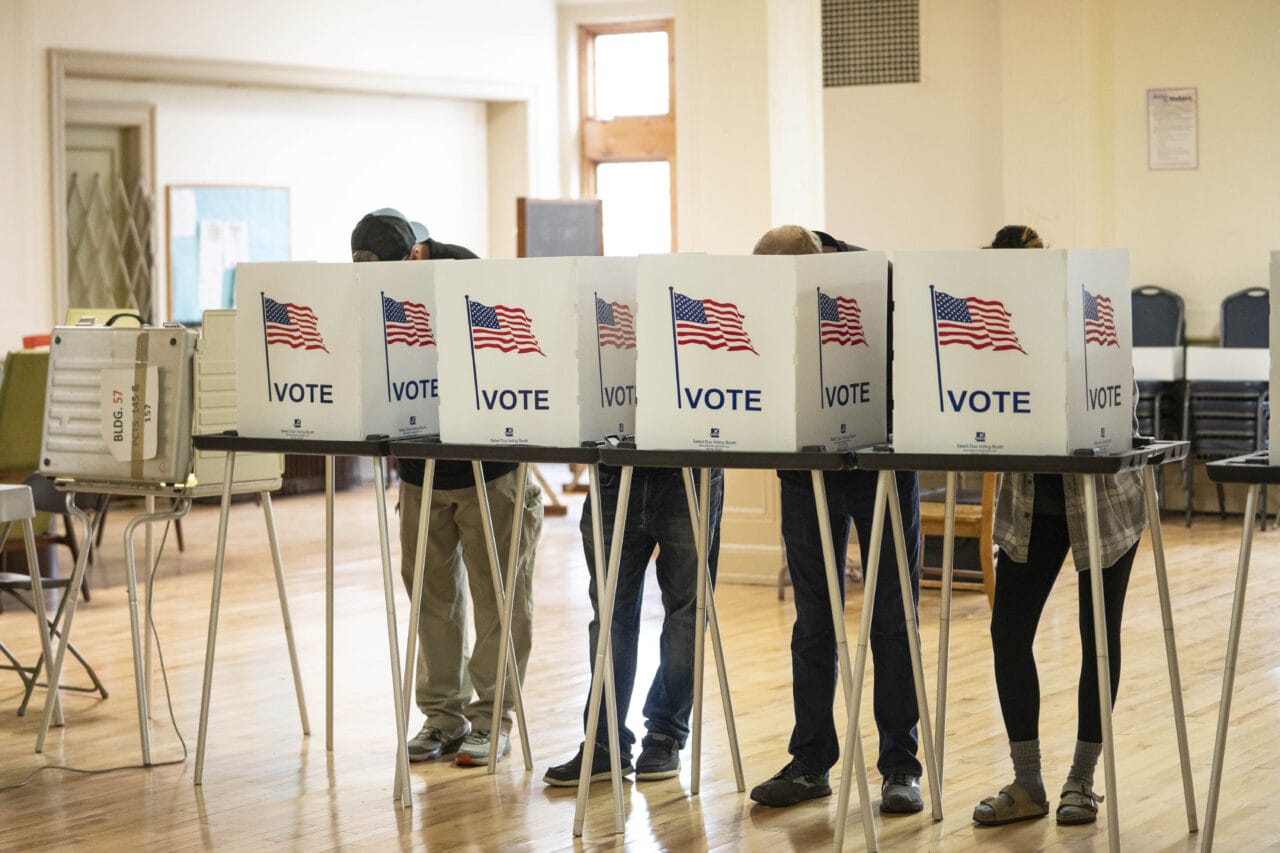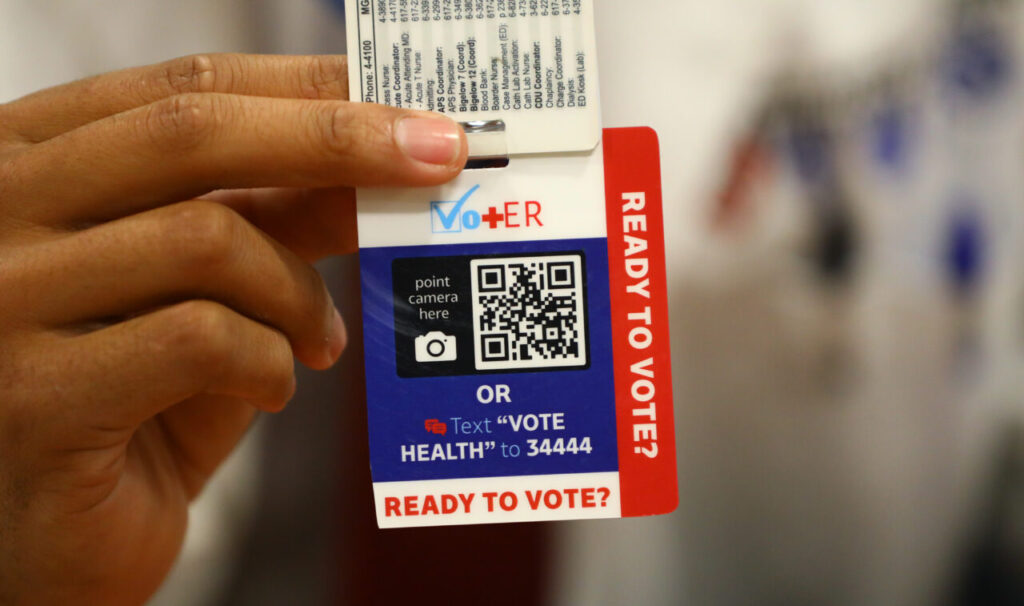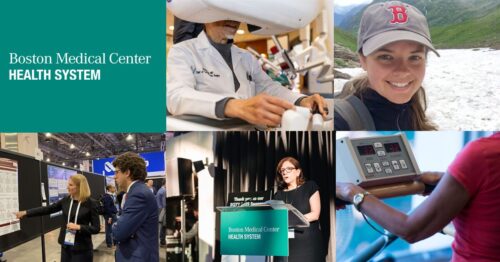Doctors Highlight Voting as a Path to Healthier Patients and Communities
November 5, 2024
By Sandra Larson, By Caitlin White

Sarah Rice, Getty Images
The American Medical Association in 2022 declared voting a social determinant of health. Boston Medical Center and other health centers have met patients where they are to encourage voter registration to benefit individual and community health.
“Get out the vote” efforts are pervasive in presidential election years like this one. What may come as a surprise, even to voting advocates who wrote letters, made phone calls, and knocked on doors, is that voter registration and voter turnout are tied not only to political outcomes, but to health and wellbeing.
The American Medical Association (AMA) in 2022 declared voting a social determinant of health, adding it to a list of such nonmedical factors as food and housing security, employment, and neighborhood conditions that are known to have a significant impact on health and wellbeing.
Over the last four years, many Boston Medical Center departments, including the Emergency Department, have been asking about voting status as part of a patient’s clinical assessment. For patients who are not yet registered or who aren’t certain, BMC uses a voting-focused “badge backer” where the patient has the option to scan a QR code on the clinician’s badge to directly access their voter registration status, update their address, register to vote, and see where and when they can vote.
“My goal is to make voter registration just a routine part of the care that we provide to our patients,” says Emily Cleveland Manchanda, MD, MPH, an emergency medicine physician at BMC. “Do you smoke? Do you wear your seatbelts? Are you registered vote? These are all questions that affect our patient’s health and can improve their health both at an individual and at a community level.”
How voting impacts your health
In June 2023, voter participation was named as a “core objective” in the U.S.’s health goals by the Office of Disease Prevention and Health Promotion. In another study, researchers found that states with more inclusive voting policies and greater levels of civic participation were healthier—and the opposite was also true. Stricter voting laws and lower participation meant a state had worse health outcomes.
On the surface, voting is part of engaging in the democratic process and can influence health policies that directly affect a person’s or public health. Empowering patients in that way drives Haeyeon Hong, MD, MS, the local health equity fellow in BMC’s Emergency Department and a Commonwealth Fund fellow in Minority Health Policy at Harvard University.
“What I’m hoping for is that patients will start to think that healthcare systems and policies are not just some high-up thing that has nothing to do with them. They, too, can have voice in it,” Hong says. “A lot of our patients don’t realize how much power they actually have.”
“My goal is to make voter registration just a routine part of the care that we provide to our patients. Do you smoke? Do you wear your seatbelts? Are you registered vote? These are all questions that affect our patient’s health and can improve their health both at an individual and at a community level.”
emily cleveland manchanda, md, mph, emergency medicine physician at bmc
However, the connection to voting and health goes beyond the downstream effects of electing representatives that endorse specific health policies.
Voting is a form of civic engagement that can help build community cohesion and a sense of belonging. This sense of belonging, first, helps prevent social isolation, which leads to better overall wellbeing. Second, this cohesive mindset fosters the sense that everyone has a stake and a voice in their community, and it helps mobilize movements around pushing for access to other social determinants of health, such as fresh food, neighborhood green spaces, and public safety.
Accessible voting and voter registration
Like with access to food and housing, access to voting is a way to build health equity.
In roughly half of U.S. states, people are automatically registered to vote when interacting with agencies such as the Department of Motor Vehicles, unless they opt out. This type of initiative cuts through barriers to registration and helps reach a broad swath of the population.
Still, access remains inequitable in many ways. Some states have tightened voting restrictions or purged people from voting lists, and the AMA declared that gerrymandering negatively impacts health outcomes.
Dr. Alister Martin, an emergency physician at Massachusetts General Hospital, recognized that healthcare settings could play a role in improving voter registration access. He founded Vot-ER, a nonprofit, nonpartisan civic engagement effort that helps healthcare providers connect patients to voter registration information quickly and easily during their visit. Today, Vot-ER has expanded to 700 sites in 350 institutions across the U.S, including at BMC.
Since Cleveland Manchanda implemented Vot-ER at BMC in 2020, more than 120 BMC providers now have badge backers, and there were nearly 500 scans of badge QR codes just over the recent three-month period of July, August, and September, resulting in more than 100 clicks on voter registration resources.

Cleveland Manchanda sees clinical staff as important partners in addressing voter registration.
“Physicians and other healthcare providers are trusted sources of information for our patients,” Cleveland Manchanda says. “Having a healthcare provider ask you whether you’re registered to vote and mentioning that voting is likely to increase your health is a highly motivating way to get folks to check their voter registration status, register to vote, and actually turn out to vote.”
Voter registration is a year-round issue
While there is heightened awareness around voting today, Election Day, for the 2024 presidential election, voter registration is relevant year-round. Having a voice in local, city, and state elections is just as important in impacting individual and community health.
Cleveland Manchanda sees that bigger picture, and she understands how her role as a physician is entwined in all of the ways a person’s environment and lifestyle impacts their health.
“My goal is that we as clinicians meet our patient’s needs, whatever they are. Sometimes that means prescribing a medication, sometimes that means providing an Uber voucher—and sometimes that means asking if someone’s registered to vote,” she says. “These are all things that help to shape our opportunities to be healthy, both within and beyond the hospital walls. And supporting our patients in those efforts is, in my mind, a core part of what it means to be a physician.”


